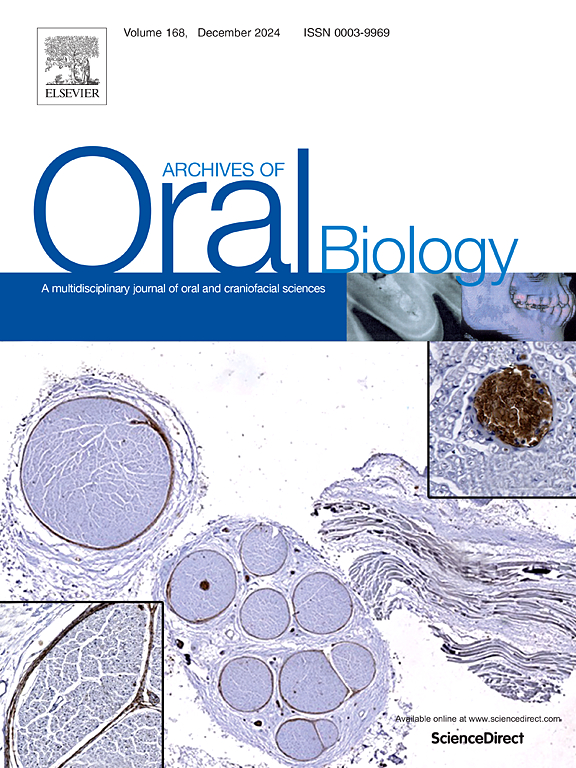Effects of chronic unpredictable mild stress-induced depression on bitter taste receptor expression in mice
IF 2.2
4区 医学
Q2 DENTISTRY, ORAL SURGERY & MEDICINE
引用次数: 0
Abstract
Objective
With the rapid increase in the pace of life, people are facing increasing pressures of all kinds, and depression has gradually become a serious psychological disorder in human society, strongly affecting normal social and physiological activities. Depression can disrupt an individual's taste perception and potentially result in taste disorders by affecting and altering taste receptors. This disruption can consequently impact their food preferences and overall eating experiences.
Design
In this study, we used the chronic unpredictable mild stress (CUMS) method to establish a depression model in male C57BL/6 J mice and explored the changes in taste receptor expression in the lingual circumvallate papillae (CP) to elucidate the effects of depression on taste. After 6 weeks of CUMS, behavioral performance evaluations, such as forced swim, open field, and elevated plus maze tests, were conducted in depression model mice. A further two-bottle choice test was subsequently performed to determine the effect of depression on bitter taste, and the expression of bitter taste receptors in the lingual CP was detected via immunofluorescence staining.
Results
In this study, we found for the first time that mice with CUMS-induced depression had decreased bitter taste sensitivity through a two-bottle choice test and demonstrated that the expression of T2r5, a receptor related to bitter taste perception, and the expression of secondary taste signaling proteins in the lingual CP were significantly decreased in mice exposed to CUMS, as determined via qRT![]() PCR and immunofluorescence staining.
PCR and immunofluorescence staining.
Conclusions
Our study highlights how CUMS influences the perception of bitterness in the peripheral taste system, potentially elucidating stress-induced changes in eating habits.
慢性不可预测的轻度应激诱导抑郁对小鼠苦味受体表达的影响
目的随着生活节奏的加快,人们面临的各种压力越来越大,抑郁症逐渐成为人类社会的一种严重心理障碍,强烈影响着人们正常的社交和生理活动。抑郁症会影响和改变味觉感受器,从而扰乱个体的味觉感知,并可能导致味觉失调。本研究采用慢性不可预知轻度应激(CUMS)法在雄性C57BL/6 J小鼠中建立抑郁模型,并探讨舌周乳头(CP)味觉受体表达的变化,以阐明抑郁对味觉的影响。服用 CUMS 6 周后,对抑郁模型小鼠进行了行为表现评估,如强迫游泳、开阔地和高架加迷宫测试。随后再进行双瓶选择测试,以确定抑郁对苦味的影响,并通过免疫荧光染色检测舌CP中苦味受体的表达。结果在这项研究中,我们首次发现由 CUMS 引起的抑郁小鼠通过双瓶选择试验降低了对苦味的敏感性,并通过 qRTPCR 和免疫荧光染色检测证明,与苦味感知相关的受体 T2r5 的表达以及舌 CP 中次级味觉信号蛋白的表达在暴露于 CUMS 的小鼠中显著下降。结论我们的研究强调了 CUMS 如何影响外周味觉系统对苦味的感知,从而有可能阐明压力引起的饮食习惯变化。
本文章由计算机程序翻译,如有差异,请以英文原文为准。
求助全文
约1分钟内获得全文
求助全文
来源期刊

Archives of oral biology
医学-牙科与口腔外科
CiteScore
5.10
自引率
3.30%
发文量
177
审稿时长
26 days
期刊介绍:
Archives of Oral Biology is an international journal which aims to publish papers of the highest scientific quality in the oral and craniofacial sciences. The journal is particularly interested in research which advances knowledge in the mechanisms of craniofacial development and disease, including:
Cell and molecular biology
Molecular genetics
Immunology
Pathogenesis
Cellular microbiology
Embryology
Syndromology
Forensic dentistry
 求助内容:
求助内容: 应助结果提醒方式:
应助结果提醒方式:


